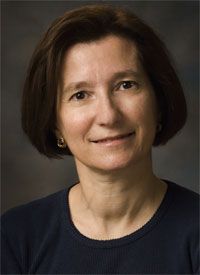Treating Elderly Patients With CLL
While there is no standard treatment for most patients with chronic lymphocytic leukemia who are age 65 years and older, several regimens are being tested in clinical trials.
DESCRIPTION

Alessandra Ferrajoli, MD
Gentle yet effective therapies are called for when treating patients with chronic lymphocytic leukemia (CLL) who are age 65 years and older. While there is no standard treatment for most of those patients, several regimens are being tested in clinical trials, according to Alessandra Ferrajoli, MD, who spoke at the 17th Annual International Congress on Hematologic Malignancies, held in February in New York City.
The treatment of elderly patients with CLL is an important area of study because 69% of patients with the disease fit into that category at the time of diagnosis, making them more likely to have comorbidities that compromise their ability to tolerate aggressive treatments, said Ferrajoli, an associate professor in the Department of Leukemia at The University of Texas MD Anderson Cancer Center. In fact, she said, at age 70 years, one-third of such patients have two or more comorbidities. Compared with people age 65 years and older in the general population, people in that age group who have CLL face a significantly increased mortality rate, she added.
For the healthiest elderly patients with CLL, the standard of treatment is a regimen of fludarabine, cyclophosphamide, and rituximab (FCR), a combination tested in the recent CLL8 trial,1versus treatment with fludarabine plus cyclophosphamide.
The overall response rate was 90% in the three-drug arm versus 80% in the two-drug arm, and the complete response rate in the experimental arm was double that of the control arm, at 44% versus 22%, respectively.
As a result, Ferrajoli said, the threedrug combination is the preferred treatment for patients who boast physical fitness, a lack of comorbidities, and excellent renal function, regardless of age.
Elderly patients with CLL who do not fit into that group, however, should be treated with the regimens they can withstand based on their age and health: supportive therapies for the frailest, reduced-intensity regimens for those whose health is somewhat compromised, and more aggressive treatments for healthier patients, Ferrajoli said. She cited a number of clinical trials aimed at developing tolerable standard treatments for those subgroups.
A study by Hillmen et al2found that adding rituximab to chlorambucil produced better results than chlorambucil alone. The investigators compared their data to that generated in an earlier study of single-agent chlorambucil in patients with CLL.
The overall response rate (ORR) in the intent-to-treat population was 82%, which was 16% higher than the ORR in the study of single-agent chlorambucil. The majority of responses, 68%, were partial.
“These data confirm that, in previously untreated CLL patients who are unable to tolerate a more intensive chemotherapy regimen, the combination of rituximab and chlorambucil is an efficacious therapy with an acceptable tolerability profile resulting in a better ORR than chlorambucil monotherapy,” the authors wrote.
In another study that is now in press, Ferrajoli and colleagues tested whether granulocyte-macrophage colony-stimulating factor (GM-CSF) would increase the activity of rituximab in untreated, elderly CLL patients.
The combination sparked a response rate of 68%, better than that of rituximab alone, with minimal toxicity. The regimen improved symptoms including fatigue, and the combination also increased the surface expression of CD20 in CLL cells, potentially making them better targets for rituximab, Ferrajoli said.
“At 3 years follow-up, over 80% of the patients are alive, and that means that, if needed, they can then be treated with subsequent or more aggressive approaches,” Ferrajoli said during her talk.
Another phase II study, CLL11,3being conducted in Germany, is evaluating whether a combination of chlorambucil and obinutuzumab (GA101), an anti-CD20 monoclonal antibody, will generate better progression-free survival in elderly patients with CLL than chlorambucil plus rituximab or chlorambucil alone.
Finally, Ferrajoli expressed excitement about the promise of lenalidomide, an immunomodulatory drug, in elderly patients with CLL. In a phase II study by Badoux et al,460 patients age 65 years and older with untreated CLL experienced a 65% ORR when treated with single-agent lenalidomide. In a recent update of the data, on file at MD Anderson, the patients had a 38% overall complete response rate, 52% had remained progression-free for more than 3 years, and 37% were still taking lenalidomide. In an evaluation after 6.5 years, investigators pinpointed median progression-free survival at 52 months; overall survival had not been reached, Ferrajoli reported. She called the results “very remarkable, considering the median age of these patients.”
Other promising agents that could eventually become frontline treatments include ibrutinib, GS-1101, and Tru-016.
In continuing to test new agents for the treatment of elderly patients with CLL, researchers should consider survival, rather than type of response, as the ideal endpoint for studies, Ferrajoli suggested. She added that investigators need to determine whether treatments should be continuous or intermittent.
Ferrajoli also cautioned that the “demands” associated with each therapy should be considered when treating elderly patients. “The number of trips they need to make to their oncology office, the need to arrange for transportation, the idea of receiving intravenous infusion and being in the infusion chair for hours, is very important for this population,” she said. “They have a strong preference for treatment they feel they are managing without going to the office.”
References
- Molica S. Clinical trial report. Progress in the treatment of chronic lymphocytic leukemia: results of the German CLL8 trial.Expert Rev Anticancer Ther. 2011;11(9):1333-1340.
- Hillmen P, Gribben JG, Follows, GA, et al. Rituximab plus chlorambucil in patients with CD20-positive B-cell chronic lymphocytic leukemia (CLL): final response analysis of an openlabel phase II study. Presented at the American Society of Hematology Annual Meeting; December 4-7, 2010; Orlando, FL.Blood. 2010;116(21). Abstract 697.
- Goede V, Fischer K, Busch R, et al. Chemoimmunotherapy with GA101 plus chlorambucil in patients with chronic lymphocytic leukemia and comorbidity: results of the CLL11 (BO21004) safety run-in [published online ahead of print August 31, 2012].Leukemia. doi: 10.1038/ leu.2012.252.
- Badoux XC, Keating MJ, Wen S, et al. Lenalidomide as initial therapy of elderly patients with chronic lymphocytic leukemia.Blood. 2011;118(13):3489-3498.






















